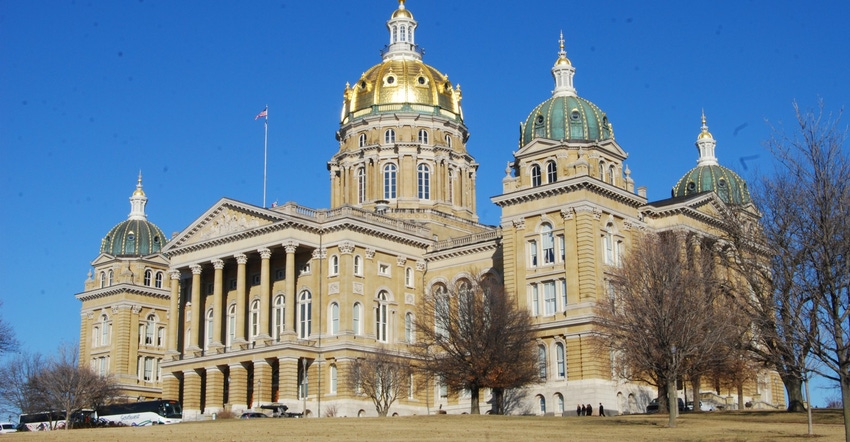January 7, 2020

The 2020 session of the Iowa Legislature gets underway Jan. 13, and in the weeks leading up to the start, Gov. Kim Reynolds and legislative leaders haven’t announced any major policy proposals.
In Iowa, attention has been mainly on national issues — the impeachment of President Donald Trump, passage of the U.S.-Mexico-Canada trade agreement, the trade war with China, and Renewable Fuel Standard waivers to oil refineries.
Leaders of Iowa ag commodity groups and farm organizations expect several environmental issues will be raised by lawmakers this year under the golden dome of the Iowa State Capitol in Des Moines. As in recent years, water quality and conservation funding will be among them.
ICGA has 4 priorities
The Iowa Corn Growers Association has four main priorities, according to Jim Greif, ICGA president:
1. Soil conservation and water quality. “We want to at least to maintain funding for existing programs and, hopefully, get a little increase,” Greif says.
2. Ethanol. “We want increased funding for Iowa’s infrastructure cost-share program.”
This cost-share program is an incentive for gas stations to install tanks, blender pumps and related infrastructure to sell higher blends of ethanol and biodiesel. “It’s hard to sell higher blends of ethanol if you don’t have the special pumps and infrastructure to handle it,” Greif says. “E15 is the popular blend at retail gas stations that are now selling it. It’s outselling the traditional E10 blend. When motorists drive up to the pump and look at the price, E15 is cheaper than E10 and is a lot lower in price compared to petroleum gasoline. And cleaner-burning ethanol is better for engines and the environment — better for air quality.”
More retail gas stations that are selling an E15 blend have recently given it a private branding, such as marketing it as Unleaded 88. “E15 has established itself in the marketplace and you can burn it in any car that’s model year 2001 and newer,” he adds. “We need to help it gain it’s potential for an even greater market share.”
3. Livestock regulations, ethanol. ICGA in 2020 state Legislature plans to advocate for livestock. “Livestock is still the No. 1 customer for corn in Iowa and the U.S.,” Greif says. “We need to take care of our livestock farmers. Anything ICGA can do to help our livestock industry is something we will work on. We support the existing regulatory framework of the livestock industry.”
4. Taxes. “We want to protect our 179 Exemption — the depreciation provision of the tax law,” he says.
ISA seeks funds for water quality
For 2020, the Iowa Soybean Association will be lobbying for more cost share for water quality practices. Iowa’s Water and Land Legacy program will likely come up for discussion, to raise more money to help farmers expand Iowa’s cover crop acreage and install other soil and water conservation measures.
In 2010 Iowans voted in the general election and approved IWILL, a law still on the books that says if Iowa’s sales tax is increased, the first three-eighths of a cent of the increase would go to a fund to improve water quality and natural resources. Lawmakers haven’t increased the state sales tax since then, so this idea hasn’t been funded.
Two years ago, the Iowa Legislature approved increased funding for water quality in a bill known as Senate File 512, signed into law by the governor. However, that funding stream provides considerably less money than the sales tax idea would provide.
“When Senate File 512 was passed, lawmakers agreed more was needed to be done to assist farmers with efforts to expand soil and water quality protection practices, to meet the goals of the Iowa Nutrient Reduction Strategy. Legislators on both sides of the aisle agreed that passage of SF 512 wouldn’t be the end of the discussion,” says ISA CEO Kirk Leeds.
Mandatory buffer strips?
Last year, the Conservation Districts of Iowa voted to support a proposal for 30-foot-wide buffer strips to be required along Iowa rivers, creeks and streams. Minnesota passed a similar law last year. However, the Iowa Soil and Water Conservation Committee in December voted to reject this resolution. The buffer strip proposal may be brought up for discussion in the 2020 Iowa Legislature.
Iowa Secretary of Agriculture Mike Naig told Wallaces Farmer recently that while he sees the need for more buffer strips to be installed in Iowa, he does not support the idea of making them mandatory. Such a proposal would likely face opposition in the Republican-controlled Legislature.
Sun and wind
Another issue that might be raised in 2020 by Iowa lawmakers has to do with solar energy. Last year a bill was introduced that would have put a tax on solar panels, making it more expensive for farmers and homeowners to install solar panels. The Iowa Pork Producers Association and environmental groups joined to defeat that proposed legislation.
Also, in the 2020 session, it’s possible state lawmakers might look at the issue of siting wind turbines in Iowa. Several counties have already developed local restrictions on where wind turbines can be built, and at least two counties are considering ordinances limiting how many turbines can be built per county. State lawmakers may decide to get involved to try to settle this matter.
Iowa Farm Bureau goals
Iowa Farm Bureau President Craig Hill says his organization will focus on protecting property taxpayers, which includes removing the costs of Iowa’s mental health system from the backs of property taxpayers.
“Our members across Iowa have clearly stated that protecting property taxpayers should be a key focus during the 2020 session,” he says.
Farm Bureau will also work with lawmakers to develop state programs to maintain the availability of private practice veterinarians who work with farm animals in rural Iowa. Iowa has a shortage of large-animal veterinarians.
“Continuing the momentum in conservation and water quality through further implementation of the Iowa Nutrient Reduction Strategy is another priority,” he adds.
You May Also Like




